Use these facts to convince, inspire, and motivate people to join your sustainable mission.
Facts are powerful tools for sustainable brands. Pitching investors, inspiring folk, or finding motivation for your mission are made easier with the right numbers to hand. Even on a planet flooded with gloomy figures about the future, a well-placed fact can still convince, energize, and jolt into action.
To help sustainable business owners, Akepa has compiled 37 facts that make the case for sustainable brands like yours.
We’ve broken these facts down into five manageable categories. Each addresses an area that sustainable businesses we work with find useful when building momentum around their climate-positive vision.
How to use these facts
- In your pitch deck – If you’re a sustainable startup pitching to investors, having cold hard facts will convince. A logical, fact-based account for doing sustainable business is essential for these audiences.
- When talking to your folk – Facts cut through the fluff. They show your sustainable followers why your business needs to exist, and how it can help them live sustainably. Sprinkle these facts lightly though. Messages are 22 times more effective when presented as a story, and some argue that fact overload can turn people off.
- For your own inspiration – Growing your sustainable business is a tough journey. Setbacks are inevitable, and it’s easy to lose motivation. These facts will reassure you that your products do have a purpose – helping people make better choices to improve the planet.
Contents (click to skip to the section):
Facts on the huge demand for sustainability
Facts on your sustainable folk
Facts to show how sustainable business is better business
Facts to show the perils of greenwashing
Facts to show why your sustainable mission counts
Facts on the circular economy
Facts to show the huge demand for sustainability
Demand for sustainable ways of living is rocketing. As folk experience the impacts of the climate crisis, businesses like yours serve a real desire to live better for the planet. These facts are excellent additions to your pitch deck to show that’s the case:
1. The sustainability-conscious consumer segment rebounded to make up 22% of shoppers worldwide in 2023, after dipping to 18% in 2022. They’re projected to spend a total of $1 trillion by 2027. (Kantar, 2023)
2. Products marketed as sustainable have grown 2 times faster than those not marketed as sustainable. (NYU Stern, 2023)
3. Brands with more sustainable products in their lineup enjoy more loyalty from customers (with 34% coming back for more) than brands with few sustainable offerings (27%). (McKinsey, 2023)
4. Sustainability-marketed products have continued to grow in shares each year since 2013, despite the pandemic and high inflation. (NYU Stern, 2024)
5. Google searches for sustainable products rose 71% from 2016-2020, showing that mastering online search is a huge opportunity to speak to sustainably conscious people. (WWF, 2021)
6. 48% of people either often or always take a company’s environmental record into account when deciding whether to recommend a product to a friend or family. (PwC, 2022)
7. 48% of new products incorporate sustainability benefits – which means that effectively communicating sustainability is now more important than ever. (NYU Stern, 2021)
8. But be careful when reading about intentions. While 70% of consumers say they care about a sustainable lifestyle, 61% still lack the awareness and action to follow through on that. (NIQ, 2023)
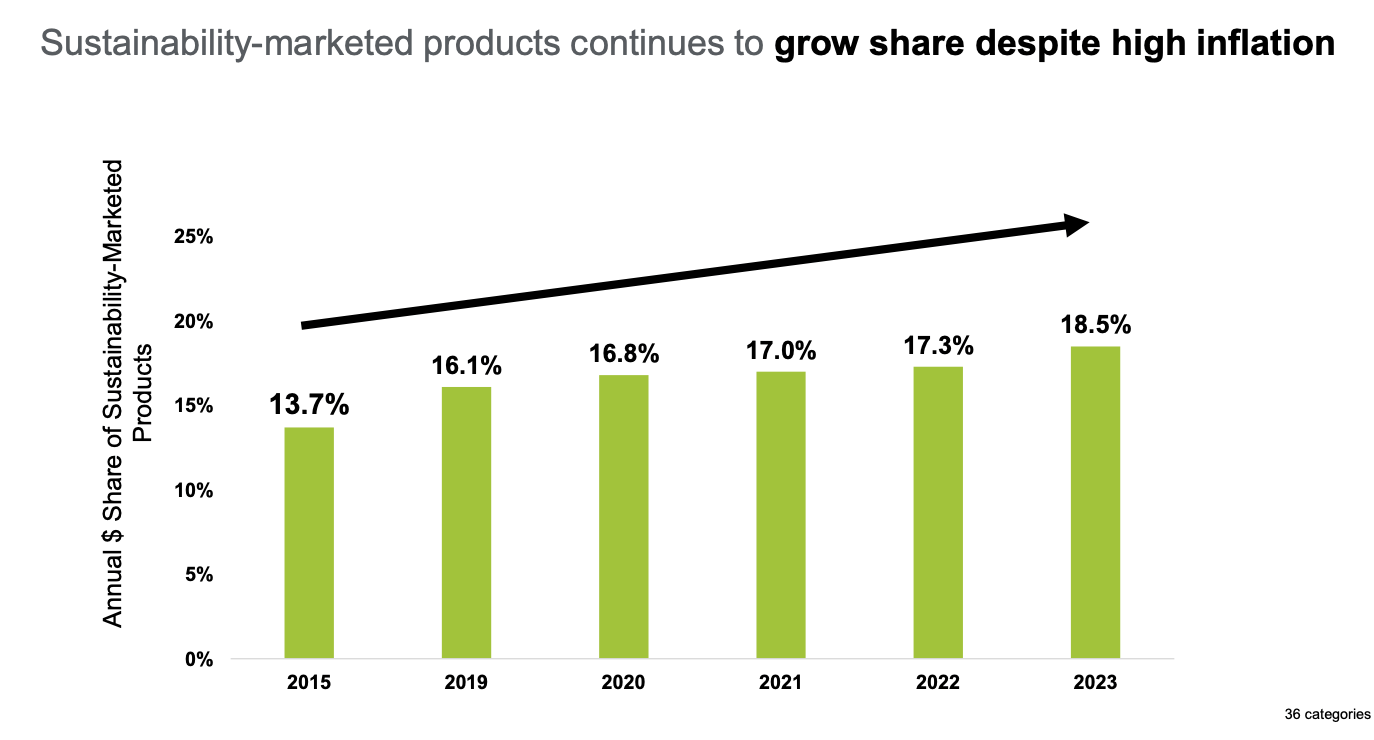
Facts on your sustainable folk
Your sustainable mission needs a following to take off. These facts narrow down the people most likely to be advocates for your sustainable mission.
9. Gen Z (1995-2012) and Millennials (1983-1994) show the highest consideration for sustainability, at 94% and 93% respectively, with 88% of Gen X (1965 – 1982) and 77% of Baby Boomers (1946 – 1964) not far behind. (ESW, 2023)
10. Surprisingly, it’s Gen X (around 1960 -1983) who are most likely to pay more than any other generation for sustainable items, at 78%. Across the board, willingness to pay a price premium of 10% has increased. (First Insight, 2021)
11. On average, consumers are willing to pay 12% more for sustainable products, but they are still priced too high. For example, in the US, consumers are willing to pay 11% more but companies charge an average 28% premium. (Bain & Company, 2023)
12. Climate change remains a top three concern for Millennials and Gen Z. Other causes for worry are costs of living (top concern), unemployment, and crime/personal safety. (Deloitte, 2024)
13. On average, 79% of consumers in fast-growing markets like China, India, and Indonesia are concerned about environmental sustainability, versus 55% in developed markets like the US and Europe. (Bain & Company, 2023)
14. If you reach many of your people online, CO2-neutral delivery is just one of the sustainable options that more than half of buyers expect to see. But only 37% are willing to pay more, meaning the costs should be covered by retailers. (SendCloud, 2023)
15. More importantly, 72% believe fully recyclable packaging is a must, and 61% think that online stores use too much packaging material to ship their orders. (SendCloud, 2023)
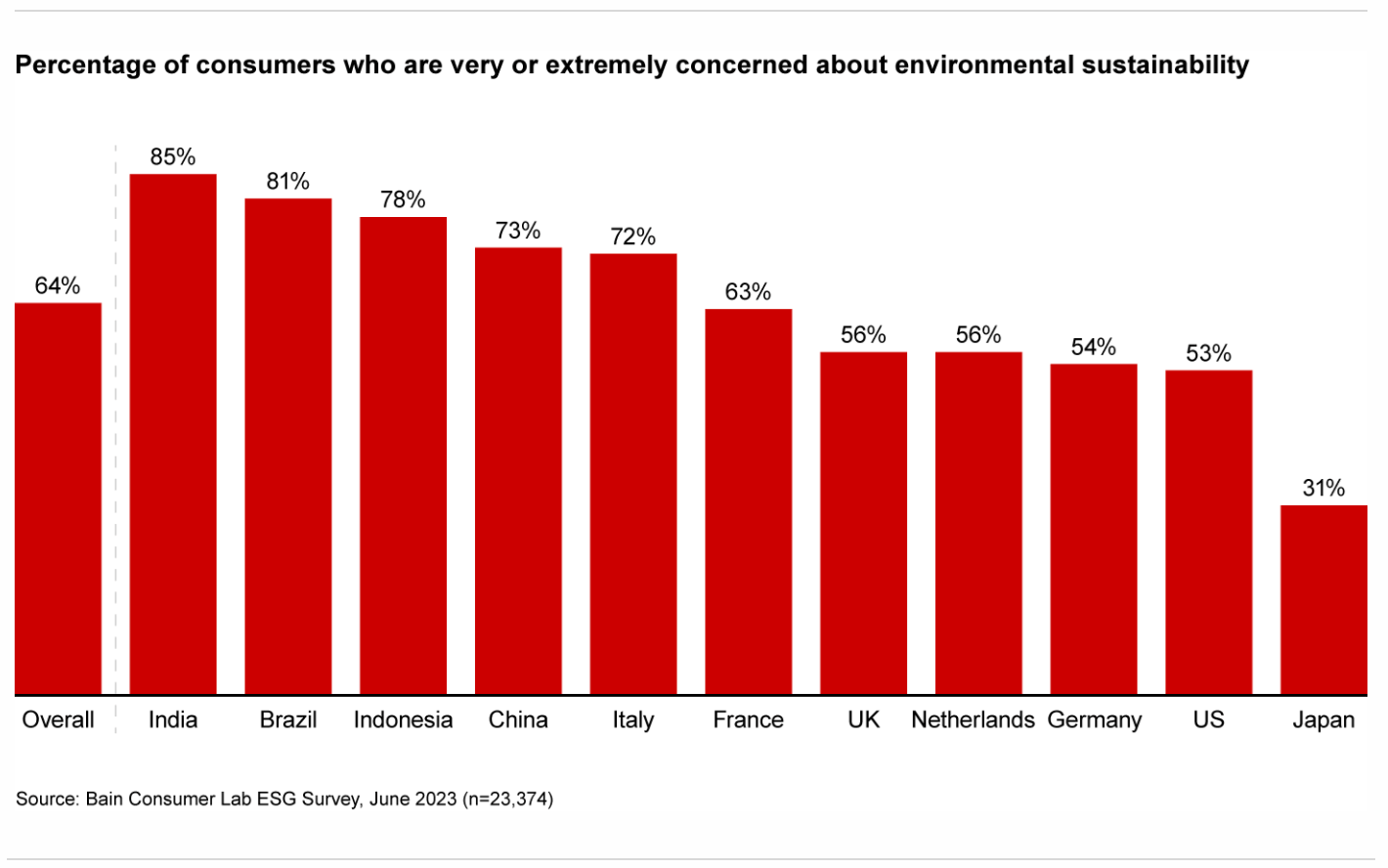
Facts to show how sustainable business is better business
Sustainably-run businesses are not just for the environment – they’re just plain better. These facts show why.
16. 77% of companies say their sustainability initiatives increase customer loyalty. 63% have seen growth in sales. (Capgemini, 2022)
17. 2 out of 3 workers (66%) say that a company’s sustainability commitments are important when applying for a job. (Michael Page, 2023)
18. 61% of global business leaders report that the lack of sustainable practices and processes will pose a long-term existential risk for their organizations. (Capgemini, 2024)
19. Companies who outperform their competitors in revenue, profit, and ESG, are more than twice as likely to grow revenues by more than 10%. (McKinsey, 2023)
20. More importantly, 56% of employees are more inclined to stay with a company if they have a strong sustainability record – meaning sustainability has implications for keeping your best people. (GetSmarter, 2021)
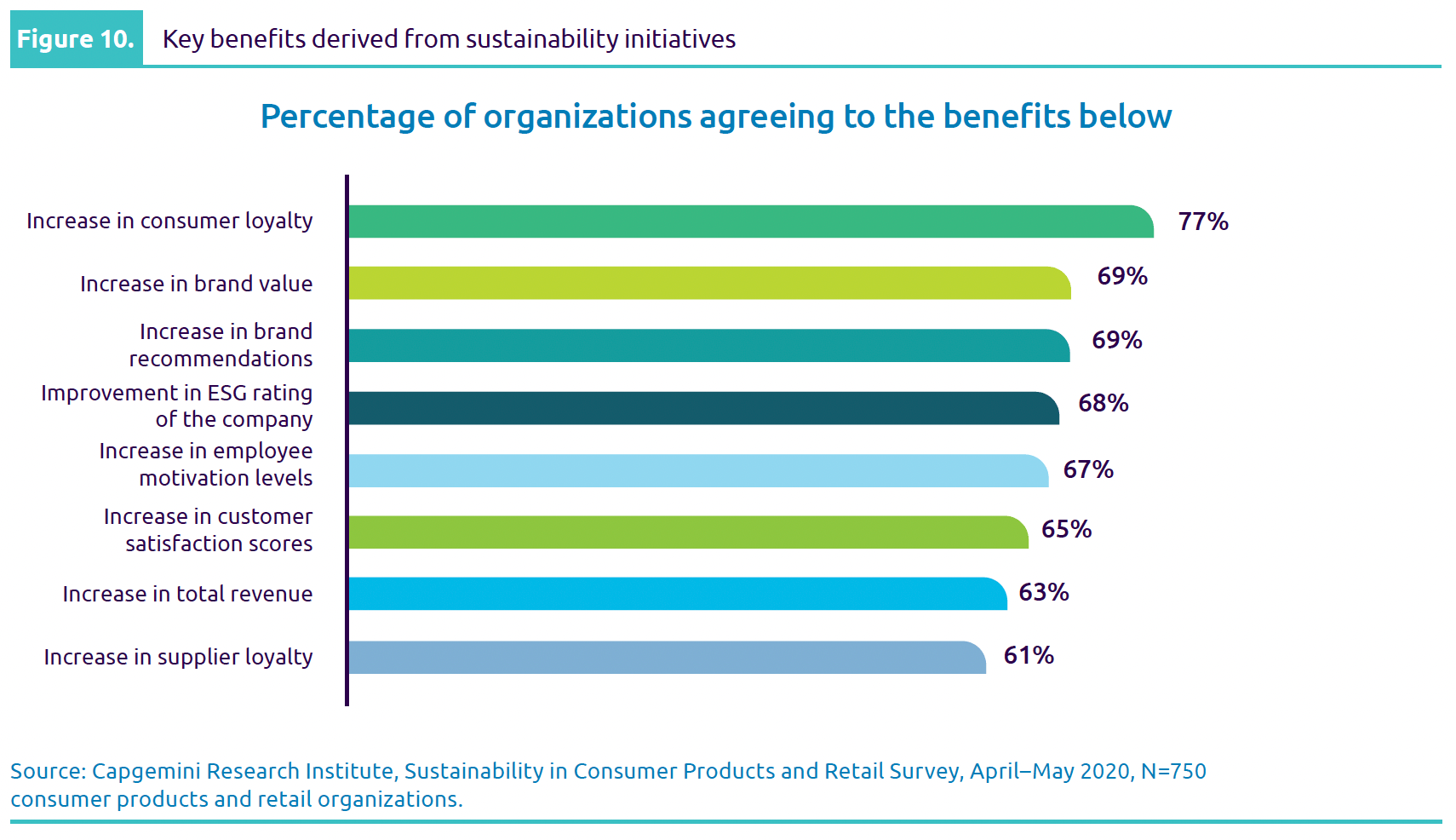
Facts to show the perils of greenwashing
We’ve written about greenwashing – and its equivocal cousin greenhushing – before at Akepa. With the demand for sustainable living growing, some companies are jumping on the bandwagon, and folk are catching on. These facts show the scale of the problem.
21. 2023 saw a massive jump in greenwashing cases. Banks and the financial services sector saw a 70% increase in climate-related greenwashing incidents within just one year. (RepRisk, 2023)
22. The same report found that one-third of public companies that are found to commit greenwashing are also associated with social washing. (RepRisk, 2023)
23. Greenwashing has become so widespread, that more than half (exactly 52%) of global shoppers have found a brand guilty of greenwashing. (Kantar, 2023)
24. 42% of online sustainability claims were found to be “exaggerated, false or deceptive” in a high-profile study by the European Union. (European Commission, 2021)
25. Nearly ¾ of executives said most organizations in their industry would be caught greenwashing if they were investigated thoroughly. (Google Cloud, 2023)
26. 55% of people want clothing brands to explain how their products are more sustainable than alternatives – simply labeling your product ‘sustainable’ is no longer enough. (Genomatica, 2021)
27. Over 50% of the world’s largest companies are committed to net zero. But one-third don’t even have emission-reduction targets set in place. (Net Zero Tracker, 2023)
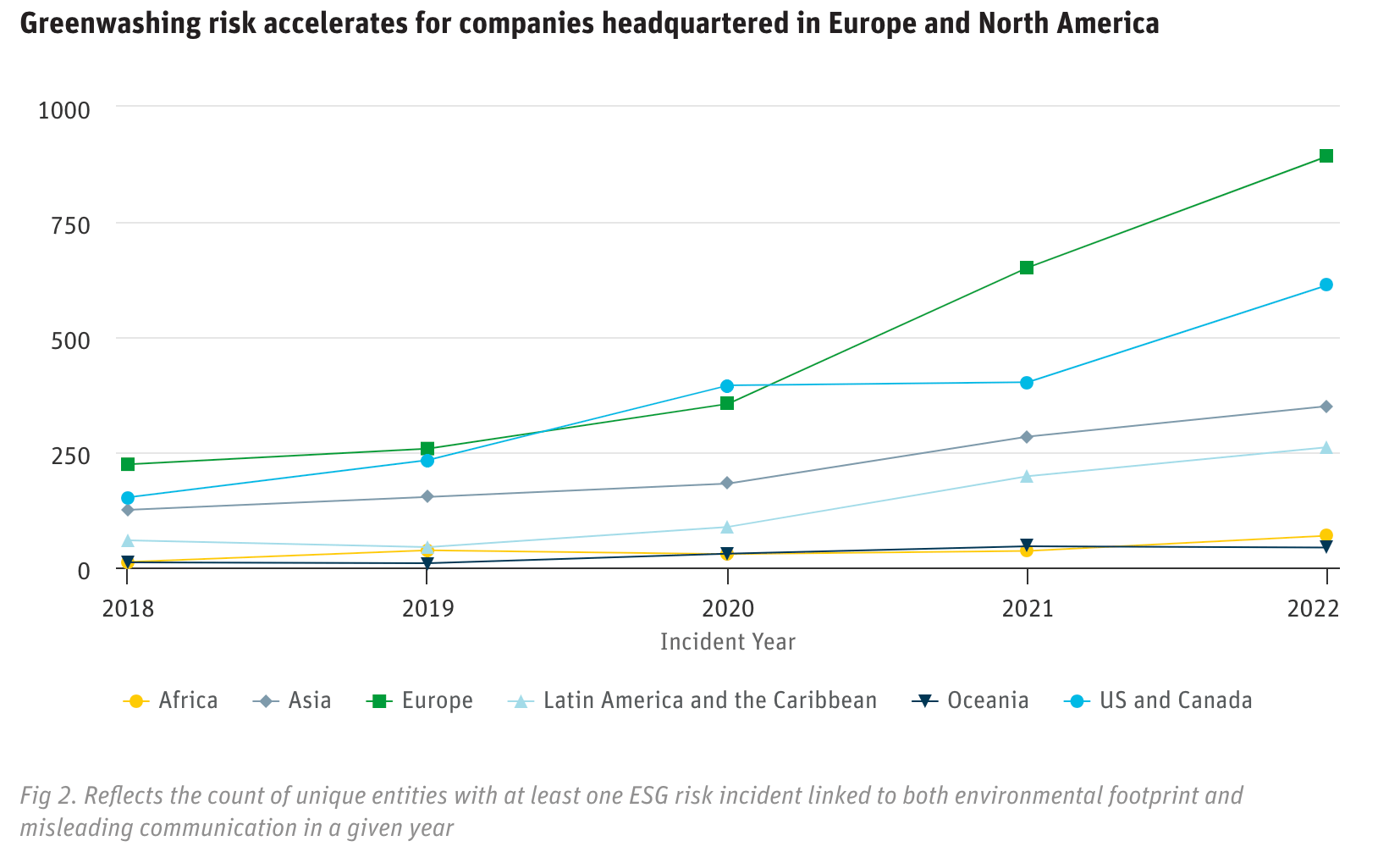
Facts to show why your sustainable mission counts
Business as it’s done now is incompatible with a safe living world. These facts highlight the scale of the problem in business as usual and show the urgency for sustainable alternatives.
28. Only 57 producers have been responsible for 80% of global CO2 emissions from fossil fuel and cement production since 2016. So your anti-fossil fuel mission is bound to make a difference. (Carbon Majors, 2024)
29. Just 20 companies are the source of more than half of the world’s single-use plastic waste. (Minderoo Foundation, 2023)
30. Current commitments made by governments and industries will reduce the annual volume of plastic flowing into the oceans by only 7% by 2040. (The Pew Charitable Trusts, 2020)
31. While more companies are committing to net zero and cutting emissions, only 18% of them are on track to reach their 2050 goal. (Accenture, 2023)
32. We’re generating more than 350 million tons of plastic waste each year. If no change is made, the amount is expected to triple to 1 billion by 2060. (Statista, 2022)
33. And finally, a hopeful fact: 57% of new companies in the consumer-goods sector are environmentally focused startups – your work is part of a movement changing the way people live. (McKinsey, 2022)
Facts on the circular economy
34. Over the past 5 years, the number of discussions, debates, and articles related to the circular economy has almost tripled, despite the global circularity rate falling from 9.1% to 7.2%. (Circle Economy Foundation, 2024)
35. Today, less than 10% of global economic activity is circular. (European Investment Bank, 2024)
36. A net total of 7 to 8 million new jobs could be created in the circular economy by 2030 (ILO, 2019). However, new research indicates that most (84%) of the current research on jobs in the circular economy display a strong Global North bias, despite most circular economy activities being located in the Global South – calling for more focus on job quality. (ILO, 2023)
37. A comprehensive circular economy approach can reduce the annual volume of plastics entering the ocean by 80%, reduce GHG emissions by 25%, and create 700,000 net additional jobs by 2040. (Ellen MacArthur Foundation, 2020).
Greenwashing facts & stats: infographic
Here are some facts and stats about the dreaded greenwashing – this time in infographic form. Feel free to share this and give us a credit if you do!
Summary
The facts above strengthen the case behind your sustainable mission. Used well, they’ll inspire, convince, and motivate.
That said, facts alone aren’t enough to tell a convincing sustainable story. If you’re looking for support telling the world about your mission, why not talk to us? We’ve supported sustainable businesses of all sizes to tell their stories through specialist digital marketing.
Take a peek at what your brand could achieve with our help, or introduce yourself at hello@thesustainableagency.com.

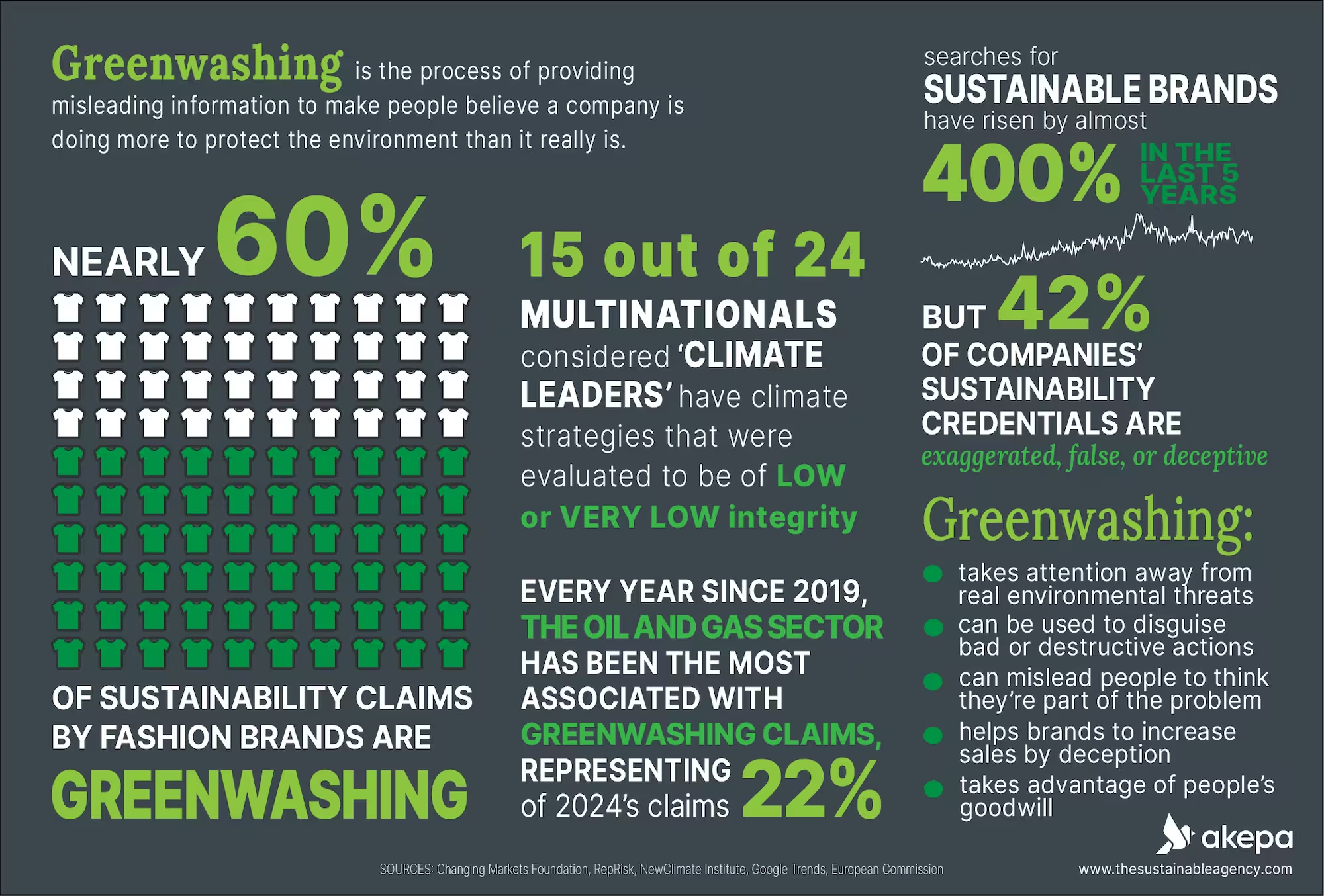


Leave a Reply